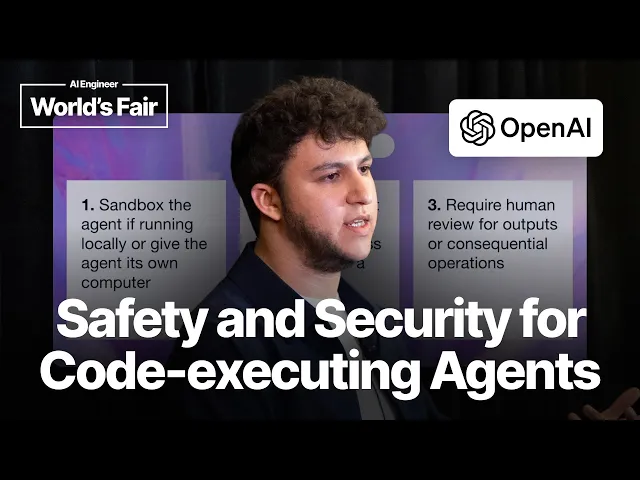Safety and security for code executing agents — Fouad Matin, OpenAI (Codex, Agent Robustness)

AI code agents need safety guardrails now
In a world where AI systems increasingly write and execute code on our behalf, the stakes couldn't be higher. OpenAI's Fouad Matin recently delivered a compelling presentation about the critical safety and security challenges facing code-executing AI agents—systems that don't just suggest code but actually run it. As these systems become more powerful and autonomous, the gap between their capabilities and our control mechanisms grows wider, creating urgent safety considerations for developers and organizations.
Key Points
-
Code-executing AI agents present unique security challenges beyond traditional AI systems, as they can directly interact with and modify systems, requiring specialized safety measures beyond just prompt engineering or content filtering.
-
The attack surface grows significantly when AI agents can execute code, introducing risks from potential malicious prompts, vulnerable infrastructure, and the opportunity for novel attack patterns that traditional security measures weren't designed to handle.
-
Safety frameworks need a multi-layered approach that includes input validation, execution sandboxing, output verification, and careful integration design to mitigate risks while preserving the utility of AI code agents.
The Security Gap We're Ignoring
The most compelling insight from Matin's presentation is that we're entering uncharted territory where AI systems can not only generate code but execute it—yet our security practices haven't evolved accordingly. This represents a fundamental shift in AI risk assessment. Traditional AI safety focuses on harmful content generation, but code-executing agents require an entirely different security paradigm.
This matters tremendously as enterprises rapidly adopt AI coding assistants to boost developer productivity. While companies are racing to implement these tools, many haven't established robust security protocols specifically designed for code-executing AI. The gap between adoption and security implementation creates a vulnerability window that could lead to significant breaches or system compromises.
Beyond the Presentation: Real-World Implications
What Matin didn't fully explore is how these security challenges are already manifesting in production environments. A recent case at a Fortune 500 financial services company illustrates this perfectly. Their internal developer platform integrated a code-generating AI assistant that had limited access to deployment pipelines. A developer inadvertently prompted the system in a way that caused it to generate and attempt to execute code that would have exposed customer data. While existing security controls caught this particular attempt, it revealed how easily conventional security
Recent Videos
How To Earn MONEY With Images (No Bullsh*t)
Smart earnings from your image collection In today's digital economy, passive income streams have become increasingly accessible to creators with various skill sets. A recent YouTube video cuts through the hype to explore legitimate ways photographers, designers, and even casual smartphone users can monetize their image collections. The strategies outlined don't rely on unrealistic promises or complicated schemes—instead, they focus on established marketplaces with proven revenue potential for image creators. Key Points Stock photography platforms like Shutterstock, Adobe Stock, and Getty Images remain viable income sources when you understand their specific requirements and optimize your submissions accordingly. Specialized marketplaces focusing...
Oct 3, 2025New SHAPE SHIFTING AI Robot Is Freaking People Out
Liquid robots will change everything In the quiet labs of Carnegie Mellon University, scientists have created something that feels plucked from science fiction—a magnetic slime robot that can transform between liquid and solid states, slipping through tight spaces before reassembling on the other side. This technology, showcased in a recent YouTube video, represents a significant leap beyond traditional robotics into a realm where machines mimic not just animal movements, but their fundamental physical properties. While the internet might be buzzing with dystopian concerns about "shape-shifting terminators," the reality offers far more promising applications that could revolutionize medicine, rescue operations, and...
Oct 3, 2025How To Do Homeless AI Tiktok Trend (Tiktok Homeless AI Tutorial)
AI homeless trend raises ethical concerns In an era where social media trends evolve faster than we can comprehend them, TikTok's "homeless AI" trend has sparked both creative engagement and serious ethical questions. The trend, which involves using AI to transform ordinary photos into images depicting homelessness, has rapidly gained traction across the platform, with creators eagerly jumping on board to showcase their digital transformations. While the technical process is relatively straightforward, the implications of digitally "becoming homeless" for entertainment deserve careful consideration. The video tutorial provides a step-by-step guide on creating these AI-generated images, explaining how users can transform...
